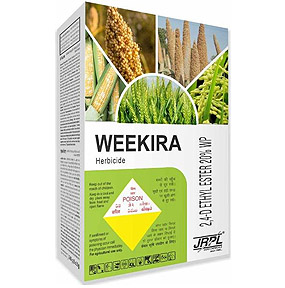Agriculture Products

WEEKIRA
DESCRIPTION
WEEKIRA (Quizalofop Ethyl 5% EC) is selective, systemic herbicide of Aryloxyphenoxy-propionates group. It is used to control narrow leaf weeds in broad leaf crops.
MODE OF ACTION
Targa Super effectively controls the narrow leaf weeds like Echinochloa spp., Goose grass, fox tail, Cynodon (doob), Large crab grass, Saccharum sp. (kans), Hemarthria sp. (suttu), Wild sorghum, Volunteer paddy, Volunteer maize, Volunteer pearl millet, etc. Targa Super is very quickly absorbed by the weeds and translocated and kill the weeds. The affected weeds are unable to regenerate. It is quickly absorbed by the weeds, hence rain even one hour after spray does not affect its effectiveness. Weed leaves turn purplish/red within 5-8 days after Targa Super application and within 10-15 days are completely killed.
| CROPS | TARGET PEST/DISEASES | DOSE PER ACRE |
|---|---|---|
| Soyabean | Echinochloa crus-galli, E. Colona, Eragrostis sp. | 300-400 ml (for annual weeds) |
| Cotton | Echinochloa crus-galli, Echinochloa colona, Dinebra retroflexa, Digitaria marginata | 300-400 ml (for annual weeds) |
| Groundnut | Echinochloa colonum, Dinebra retroflexa, Dactyloctenium sp. | 300-400 ml (for annual weeds) |
| Black gram | Eleusine indica, Dactyloctenium aegyptium, Digitaria sanguinalis, Eragrostis sp., Paspalidium sp., Echinochloa sp., Dinebra retroflexa | 300-400 ml (for annual weeds) |
| Onion | Digitaria sp., Eleusine indicia, Dactylocteniumaegyptium, Eragrostis sp., | 300-400 ml (for annual weeds) |
PACK SIZE
100 ml, 250 ml, 500 ml, 1 Ltr
FEATURES & BENEFITS
- It is a very effective weedicide for control of narrow leaf weeds in broad leaf crops.
- It does not burn the weeds but kills the weeds - so they do not regerminate.
- These dead weeds turn into organic manure to boost plant health and vigour.
- Targa Super is strictly not recommended on paddy, wheat, sorghum, maize, barley, pearl millet, sugarcane crop.
- Targa Super is recommended at 500-600 ml for control of perennial weeds like Kans and Doob.

MASHALL
DESCRIPTION
MASHALL (2,4-D Amine Salt 58% SL)
and Mashall are the selective, systemic weedicides of
Phenoxyacetic group.
MODE OF ACTION
MASHALL is
used on a wide variety of terrestrial and aquatic broadleaf weeds. It has
little effect on grasses. It appears to work by causing uncontrolled cell
division in vascular tissue. Abnormal increases in cell wall plasticity,
biosynthesis of proteins, and production of ethylene occur in plant tissues
following exposure, and these processes are responsible for uncontrolled cell
division. The ester forms of 2, 4-D penetrate foliage,
whereas plant roots absorb the salt forms. 2, 4-D appears to be similar in
action to other auxin-type herbicides. .It is
absorbed by the leaves and roots and translocated in
to the weed plants.
|
|
|
|
|
|
|
|
|
|
|
|
|
|
|
|
|
|
|
|
|
|
|
|
PACK SIZE
100 ml, 250 ml, 400 ml, 500 ml, 1 Ltr
FEATURES &
BENEFITS
- Apart from effectively controlling broad leaf weeds,
these also control the Cyperus sp.
- There is no adverse effect on crops with recommended
dose of Mashall
